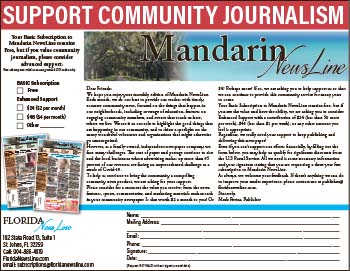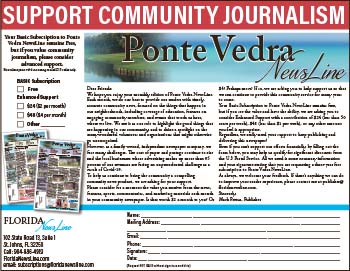By Lesley Arrandale
mail@floridanewsline.com
By the time we reach July, high summer temperatures and humidity will be upon us, along with the threat of strong summer storms, if not hurricanes. Hopefully we have planted our annuals and perennials, replenished mulch, trimmed dead wood and tamed unruly shrubbery in good time, so we can enjoy our beautiful handiwork from the comfort of our air conditioned homes.
Everyday maintenance tasks don’t go away, however, and that means weeding, watering (but only when needed), fertilizing sensibly (more is not better), scouting for pests and so on.
It’s important to make sure the irrigation system stays off when rain is expected. Even if it’s your day to water, if your grass is looking perfectly fine, that alone is a reason to turn off the water. Lawns that get overwatered can suffer from diseases and insect problems, since too much tender lush growth invites both problems. For a reminder of our watering schedules, see http://tinyurl.com/jpw8hwu.
When dealing with lawns, St. Augustine in particular might benefit from a summer application of iron rather than a nitrogenous fertilizer if it has an overall yellow appearance. If you are concerned about fending off insects or diseases, the best way to keep your lawn healthy is to follow good cultural practices.
While looking for a good source of information, I discovered a presentation from the Florida-Friendly website, produced for the lawn care trade: http://tinyurl.com/j7tzthc. It illustrates what standards the University of Florida is setting for them. For information specifically for the homeowner, check out the comprehensive articles at http://hort.ifas.ufl.edu/yourfloridalawn/.
Vegetables need regular attention, as insects and diseases begin to build with the summer heat and rains (http://edis.ifas.ufl.edu/vh021). I find an early morning trip to the veg patch with a cup of tea in hand is a good start to the day. By taking stock of the condition of the plants and scouting for insects – both good and bad, which I find get things in perspective – I can take care of any problems and then look forward to the evening’s harvest.
Once summer crops are up and growing, two or three light applications of fertilizer through the season is usually enough. Compost is invaluable, adding soil-conditioning humus as well as healthy microorganisms and nutrients. Homemade compost is something almost all of us can produce with minimal effort. A static 3 x 3 x 3 foot pile of mixed green and brown garden and kitchen waste will inevitably decompose, and turning the pile every week or two and making sure that it stays moist but not wet will speed up the process (http://edis.ifas.ufl.edu/ep323). Top-dressing with well-rotted compost lightly but regularly is to be encouraged. The only snag: there is never enough to go around.
If you have a small lot with no room for a compost pile, vermiculture might be your choice. With a handful or two of red wiggler worms, available from a bait shop, and not much more than a plastic box, clean shredded newspaper and kitchen scraps, you can produce high-quality fertilizer (aka worm castings) in a matter of weeks: http://tinyurl.com/jsenj9j.
Spring bulbs will be available any time now and mail order companies often give a discount for early orders. For suitable bulbs for northeast Florida, see http://tinyurl.com/zbudcgv. Classic daffodils are not so easy to grow here, but paperwhites do well. Being fond of blue flowers, I planted some Ipheion uniflorum a few years ago. They are small, up to six inches tall, with starry one-inch flowers, and make a pretty show planted in groups; Wisley blue is a particularly lovely shade. Also available in pink and white, they could make a fine substitute for snowdrops (Galanthus nivalis). They need at least partial sun and well-drained soil.
The next issue of A New Leaf should be out in early July (http://tinyurl.com/73cdjjo). Happy gardening and stay cool.
Lesley Arrandale is a Master Gardener with the Duval County Cooperative Extension Service/City of Jacksonville Agriculture Department, which is a partnership between the United State Department of Agriculture (USDA), the University of Florida Institute of Food and Agricultural Sciences (UF/IFAS) and the City of Jacksonville.











